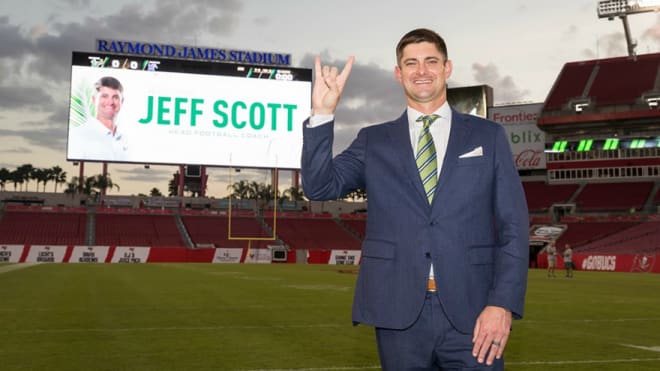Q&A: Jeff Scott talks to BullsInsider, Part II
College football programs nationwide are dealing with the unique circumstances resulting from the global COVID-19 pandemic. Like every other school USF has ended on-campus classes, students are taking online classes and spring sports schedules were canceled and spring football practice is…well, let’s say it has been paused.
Still, the coaches and players have work to do.
To get an idea of what is happening with the Bulls football program, BullsInsider.com spoke with head coach Jeff Scott. Here is part the conclusion of our two-part interview with coach Scott.

BullsInsider: How much of an issue is the nutrition angle? In many cases, kids aren’t going to be able to even leave their home much. Sometimes being at home may be a tough nutrition time in general. Sometimes family members eat snacks that you might not want your players to be eating.
JS: Yeah, and that’s definitely a concern and something that we’ve spent a lot of time talking about. I mean, number one, we just want to make sure that all of our players have enough food to be able to eat. Obviously, when they’re here at school, we provide a meal plan and we provide meals at our facility around the workouts. So now each of them are going back into their home. They’re having to kind of rely on either their parents or they’re actually going to the grocery store themselves.
So, the biggest piece is just the education. That’s something that we’re talking about each day with our young man when we’re having our team meeting or position meetings. We also have a new nutritionist, Alexa Rodriguez, who’s new to our athletic program. She has also created an Instagram page so she can communicate some ideas daily to our student athletes and to our football players. So, I think the biggest piece is just really trying to educate our players like we always have done but now it’s even more critical that they’re all at home and not here around the campus.
BullsInsider: On the other side of the coin, can the situation the pandemic has put all of us in create defining moments for some players? Like it might reveal the character or the drive of players?
JS: Absolutely, and that's been part of my message to our players. Anytime that you go through adversity or anytime you find yourself in a challenge, how you respond to that reveals a lot about who you are as a person and who you are as a player and your accountability and discipline and work ethic and all those things that are important to us as a football program. This is still very early in the process with the new coaching staff coming in. We're still trying to learn a lot of things about our players. So in a different way, you know, this is this is definitely a situation where we are going to learn a lot of our guys. How well they're communicating with us, how well they're keeping up with the plan that we've laid out for them during this time. And, you know, whenever they get back, whenever we do get back and you know, what do they look like physically? Have they been keeping up with the workouts and then where are they mentally with our schemes? I'll think that would definitely show. And there will be some separation with some guys that have done an excellent job and maybe some guys that did not do what was asked or required. And that definitely will have an impact on where they are on our depth chart how much they're going to be included in our plan moving forward.
BullsInsider: Without getting into specifics or talking about any individual cases how much could something like this, and everything associated with it, complicate a rehab process for a player who was injured, had a procedure or was planning on having one?
JS: That, again goes back to the communication. So, our medical staff is communicating with those guys on a really on a daily basis and really giving them things that they need to be doing as part of their rehab. I think a big part of that, again, goes back to the individual. How committed they are to do and what's being asked of them. I feel like right now that our guys are doing a good job. I think in some ways this actually could be a positive for them, giving them time to recover before, you know, assuming that we are going to be able to back and have some type of practice going on in June. There's some guys that were out for the spring but may be back in June or July and may actually benefit from these practices being delayed.
BullsInsider: On the recruiting side how challenging is it not having the April/May evaluation period for your new staff to build relationships at high schools and sell your vision of the program?
JS: I think in one way the challenge is on the evaluation side. I think coaches we’re used to being able to – assistant coaches are used to being to – go out on the road in April and May and watch these guys practice and go through drills with their high school team. That's always been a valuable piece of the recruiting process. The evaluation process. Then I think the other thing that that you miss is the opportunity for the prospects to come on your campus and be able to see your facilities, be able to see what your campus looks like, meet all the coaches in person and sit down in the head coach’s office. You know, obviously, those are things we're not able to do now. But, in my opinion, there's probably more communication going on right now between college coaches and recruits because both groups are at home. Both groups have very few distractions pulling them away. So, I would probably say that this spring there's more communication going on between coaches and prospects and families. I know I do about eight video conferences every night with our top recruits and with high school coaches. So, you know, just finding a way to use the technology, whether it be Zoom or Microsoft Teams or FaceTime. You know, I did several meetings last night where it felt like I was doing an in-home meeting right there. I had the young man and his parents sitting next to him and I had an opportunity to really visit with him for about forty-five minutes. It felt very similar to maybe a December or January in-home visit. So I think, you know, coaches are trying to find ways using the technology to, you know, use this time the best.
BullsInsider: What is the best piece of advice you’ve received from another coach since taking the USF job?
JS: I would probably say, I've received a lot of advice, that I think the biggest thing probably that I lean on is from Coach (Dabo) Swinney. Obviously coming from Clemson, you know, his message to me was really just to kind of have a daily focus and don't worry about trying to get everything accomplished in the first week or the first month or the first year. Just really kind of take those day by day. The small wins each day to really get to where you ultimately want to be. I think that's definitely something I've been able to have to take into this situation and not maybe try to get overwhelmed as a staff of all the things that we have to accomplish. I've really just kind of been staying locked in on the daily task that we're doing. I think we'll look up after a couple months and feel really good about the progress we've been able to make.
